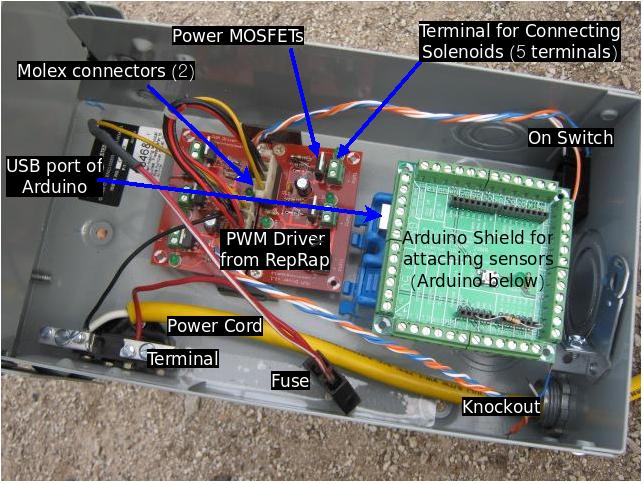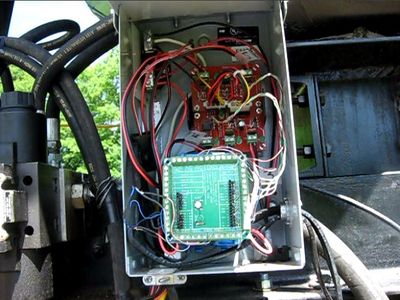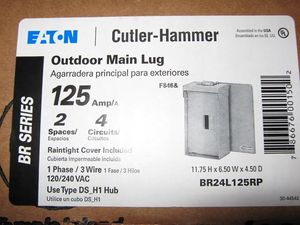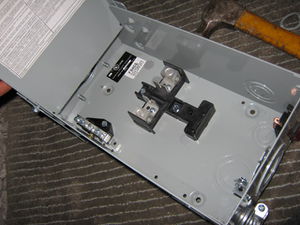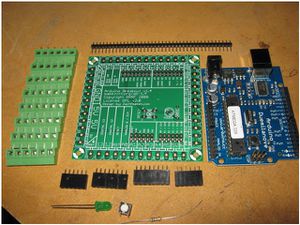CEB Press/Manufacturing Instructions/Controller Box/FeF Liberator Controller
Jump to navigation
Jump to search
Step 2
Source the electronics. Here is a diagram of the controller box
Here is the complete controller installed:
Gross Electronics:
- Electronics Box - local hardware store
- Extension Cord
- Or house wiring with Female Plug and Male Plug.
- 2 alligator clips for battery connection - auto parts store
- House wiring box (blue box in picture above below the Arduino Shield - hardware store
- Fuse holder - car parts store
- 12v quick connect plugs - 5 pairs - for quick-coupling to solenoids out of controller box - car parts store
- Stranded 5A wire for solenoid connections
- Spade terminals (10) for connection to solenoid terminals
- Underground phone cable - makes very tough connectors for sensors
- Potting compound
- PVC pipe - with 1 end capped
- Stranded Cat 5 wire for sensor connections
- [5] Supermagnets -
Microelectronics:
- [2] Hall Effect Sensors - Sparkfun
- [1] Arduino shield kit - Makerbot
- [1] Arduino - Makerbot
- [2] RepRap PWM Driver Boards
Components for PWM Driver Boards
- [1] Replacement MOSFETS -
- []
Step 3
Shopping list for items which are shipped:
- [1] Arduino breakout shield - $25, Makerbot
- Assembly instructions - [1]
- [1] Arduino (Duemilanove) - $30, Makerbot
- [2] Solenoid drivers -$13 ea., Makerbot
- Assembly instructions - [2].
- total cost with shipping - $88.25
- [4] MOSFET replacements (see discussion) for solenoid drivers, VNP35N07-E - $3.34, Future Electronics (if not available, search at Octopart) (grate shaker is automated, no sensors needed for it)
- Notes: The cheaper version recommended by Nophead from RepRap was this [3]. See discussion.
- Total $25.70 (for 5)
- [2] Hall Effect sensors - $0.95 ea, Sparkfun
- Total $9.16 (for 5)
- [4] 3/8" V-groove bearings - $7.77 ea, VXB
- Total $42.47
- [6] Supermagnets - $0.48, Gaussboys
- Total $11.11 (for 12)
Grand total for electronics, magnets, and bearings - $176.69
- [1] Potting Compound - $22 for 48 oz, Polymer Composites
- Molex connector for powering solenoid drivers - [4]
- [1] Fuse holder - [5]
Step 4
Put together control box and test sensors
- Assemble entire Control Box
- Blue spacer box - Arduino attached on top with 2 small screws. Slightly slanted attachment to make screw holes fit on blue spacer box
- Terminal in electrical outlet box cut in half on metal cutoff saw to create + and - terminals
- Plastic mount on bottom of electrical box was shaved to allow 2 solenoid drivers to fit
- Test Arduino on laptop - for example by blinking Channel 13 output on Duemilanove.
- Test sensors by passing magnets over them. See this sample code.
- Data Sheet
- Supply voltage is 5V from the Arduino breakout shield
- The pins are +,-, OUT reading from top (printed / smaller face)
- The output is "Open Drain" - this means you need a "pull up" resistor on the output (10K connected to +)
- This model is "latching" which means it turns on from one pole, and off by the other, remembering its state in the meantime.
Step 5
- Test solenoid valves by attaching power to battery and running this sample code for 2 solenoid channels.
- Note we can reduce 3 solenoid channels to 2 by running both the shaker motor and the drawer cylinder from the same channel - the shaker is activated at every stroke of the drawer, as there is ample hydraulic fluid flow available in that part of the overall CEB operation cycle.
Step 6
Build sensor and magnet mounts, attach to the machine
Step 7
Mount control box and solenoid valve on the machine
Step 8
Test the entire machine
- Test motion of main cylinder with this code
- Test motion of soil drawer cylinder with this code.
- Test motion of both cylinders, and machine is ready to run.
